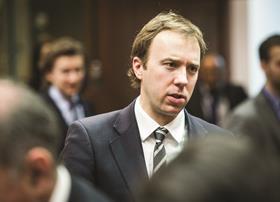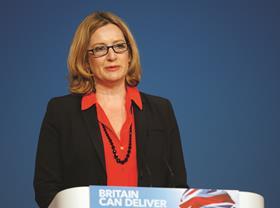David Cameron’s extensive reshuffle has dealt construction and housing a whole new hand of ministers

Construction and housing were dealt a new set of ministers yesterday, after David Cameron undertook the most extensive reshuffle of his government since coming to power four years ago.
The reshuffle, 10 months out from the general election, saw business minister Michael Fallon, who had held the construction and energy briefs, appointed defence secretary, in place of Philip Hammond, who was appointed foreign secretary.
Fallon was replaced by Matthew Hancock in the business department, who now takes the construction portfolio and, like Fallon, will also lead on energy in the Department of Energy and Climate Change. Hancock will also now attend cabinet.
Hancock, MP for West Suffolk, was previously skills minister in the business department. He was elected to parliament in 2010 and was previously an advisor to shadow chancellor George Osborne, as well as an economist at the Bank of England.
Meanwhile, planning minister Nick Boles was moved to a new role straddling the business and education departments, with his planning brief handed to Brandon Lewis, who was promoted from junior minister to minister of state in the Department for Communities and Local Government (DCLG).
Lewis was also given lead responsibility for housing in DCLG, taking over from junior minister Kris Hopkins, who was only given the housing brief in October.

The appointment of Lewis as housing minister means the brief has now been restored to senior ministerial level, after it was down graded to junior ministerial level during the prime minister’s previous reshuffle.
Sarah McMonagle, head of external affairs at the Federation of Master Builders, said Hancock’s invitation to attend cabinet was a positive move as it showed the prime minister had recognised “how important our industry is in terms of delivering the government’s economic, social and environmental objectives”.
However, she added: “We hope that Hancock does not repeat the mistakes made by his predecessor Michael Fallon who did not make the most of this unique position that straddles both construction and energy policy.
“More specifically, we felt he didn’t do enough in terms of driving forward the retrofit agenda, an area where government still has a mountain to climb.
“Also when we compare Fallon to his predecessor Mark Prisk, who tirelessly worked with our sector in both government and opposition, he was not the passionate champion he could have been.”

There were also changes in the education department, with Nicky Morgan appointed education secretary after Michael Gove was moved from the department to become the government’s chief whip.
Morgan, MP for Loughborough, was part of the Conservative’s 2010 intake. She is a former corporate lawyer and is considered a Cameron loyalist and a safe pair of hands within the party.
In other changes in education, Nick Gibb has returned to the department as schools minister, a role he previously held before being ejected in David Cameron’s 2012 reshuffle.
David Cameron said Gibb would work with Morgan “to ensure no let up in education reforms’.
Meanwhile, at the Department of Energy and Climate Change, energy minister Greg Barker stepped down, with his role leading on the Green Deal and energy efficiency taken on by new junior minister Amber Rudd.
Rudd, MP for Hastings and Rye, is part of the Conservative’s 2010 intake

Barker, MP for Bexhill and Battle, was one of the Conservative’s key modernising figures and was, famously, the minister who posed with David Cameron in the Arctic eight years ago, as part of the Tory leader’s efforts to reposition the party on the climate change debate.
He launched the Green Deal in 2012 and has been responsible for its roll-out, but has been criticised for the slow take up of the flagship energy efficiency scheme.
He said he would also be stepping down from parliament at the next election.
Paul King, chief executive of the UK Green Building Council, said Barker had been “a tireless champion of energy efficiency”.
He added: “He will leave a big gap in the Tory party - it’s difficult not to fear for the future of blue-green politics.”
“This is one of the most important briefs in government and Amber Rudd can’t simply run out the clock to the election.”
The appointment of Morgan and Gibb means the construction industry has a new set of ministers in the Department for Education, as well as a new construction minister in the business department, a new housing and planning minister in the communities department and a new lead on energy efficiency in DECC.
Mark Robinson, group chief Executive of public procurement body Scape, said the number of changes was worrying. “Re-arranging the deck chairs can bring new ideas and creativity, but my concern is that the sheer number of changes across construction, education, housing, energy and planning, will leave us rudderless and drifting until the next election, as the incoming ministers try to grasp the complex challenges our industry is facing.”
“The UK economy might be on the mend but figures show that the construction industry has not yet fully recovered from the recession.”
Reshuffle: Other changes
- Environment secretary Owen Paterson replaced by Liz Truss
- Transport minister Stephen Hammond replaced by John Hayes
- Universities minister David Willets replaced by Greg Clark
- Sir Bob Kerslake to step down as head of the Civil Service and permanent secretary of the Department for Communities and Local Government



























No comments yet